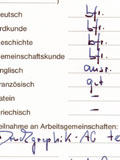Children and Juveniles

Parents are actively encouraged to take an interest in the progress of their children in kindergarten and at school. Many kindergartens have parents’ advisory boards called "Elternbeiräte". There are often parent-teacher meetings ("Elternsprechtage") to discuss the children’s progress. Parents also have the possibility to taken part in an "Elternpflegschaft" or "Klassenpflegschaft" or in a "Schulpflegschaft" or "Schulkonferenz" which are parents’ committees that meet to discuss school life. Schoolchildren are also encouraged to become active as class speakers or in various student groupings such as the "Schülervertretung".
Child Benefit
Parents who have one or more children receive child benefit ("Kindergeld"). The benefit is staggered, increasing as the number of children increases. Child benefit is paid even if parents are not in employment. The child benefit must be applied for at the family section ("Familienkasse") of the Employment Office or directly from the employer.
![]() Note: A brochure on state child benefit and raising children, etc, is available from the "Bundesministerium für Familie, Frauen, Senioren und Jugend" (Federal Ministry for Family, Women, Seniors and Youth). It is called "Staatliche Hilfen für Familien" (State Aid for Families). You can find this information at advice centres in your local area.
Note: A brochure on state child benefit and raising children, etc, is available from the "Bundesministerium für Familie, Frauen, Senioren und Jugend" (Federal Ministry for Family, Women, Seniors and Youth). It is called "Staatliche Hilfen für Familien" (State Aid for Families). You can find this information at advice centres in your local area.
![]() www.bmfsfj.de
www.bmfsfj.de
Kindergarten

Every child above the age of three has a legal right to a place in kindergarten. This right should be used as children make friends and playmates in the kindergarten (also called "Kita"), and they have the chance to learn German while playing. Parents have to pay some of the costs for a place in kindergarten: the amount due depends on the income of the parents. Most kindergartens are half-day crèches (mornings until noon). Around 30 per cent offer full day-care. Kindergartens are run by the local authorities ("Kommunen"), churches and charitable organisations ("Wohlfahrtsverbände"). There are also kindergartens ("Kitas") run by parents’ associations and by companies for their employees ("Betriebskindergarten"). Parents should look for a suitable kindergarten as soon as possible in order to find one close to the family home. Information can be found at the local town hall. Children under the age of three do not have a legal right to a place in kindergarten. These places can be rare and the chances of getting a place are better the earlier a place is applied for. There are also a number of pre-school programmes in many towns and cities. Many primary schools offer children the chance to get acquainted with school life one year before real school life begins. This gives the children a chance to improve their German in a fun atmosphere. These half-day programmes are free.
Schools

All children in Germany must attend school. School regulations vary in Germany‘s 16 states but normally children begin school at the age of 6. Certain conditions permit parents to apply for a place at school earlier or later than 6 years of age. Local school offices provide information on schooling. The new school year begins in Germany after the summer holidays.
Most schools are half-day. That means lessons are given from the morning until early afternoon. During the first two years children often only stay at school for a few hours. There are also some schools that teach in the afternoon. Schools also provide extra coaching should children need special assistance because they are new in Germany. This extra coaching is often called "Förderunterricht", "Nachhilfe" or "Hausaufgaben-Hilfe". Charitable organisations also provide information on respective coaching programmes. Children attend school for at least 9 or 10 years. They can also stay longer and do the final exams known as the "Abitur". Or they can leave school and do an apprenticeship once they are 16 years of age or over.
From the ages of 6 to 10 or 12, children attend primary school ("Grundschule"). Primary school lasts 4 years ("Class 1 to 4"); in some states 6 years. After primary school children are sent to different types of secondary schools: the "Hauptschule", Realschule", "Gesamtschule" or "Gymnasium". The "Gesamtschule" accepts children of all learning abilities. The most suitable school for your child is agreed upon in conjunction with the teachers. It is also possible to change schools.
"Hauptschulen" are secondary schools generally attended by children from class 5 until class 9. The "Realschule" is generally attended by schoolchildren from class 5 until class 10. Most children attending these schools go on to do an apprenticeship, or they visit a technical college that prepares them for vocational professions (for instance the "Handelsschule" or business school). Alternatively, they can transfer to a "Gymnasium", the highest form of secondary school in Germany.
Juveniles and Vocational Training
Students learn how they can apply for vocational training during years 9 and 10 at school. Information is also available at the vocational advice centres of the local Employment Offices, at the vocational information centres ("Berufsinformationszentren", "BIZ" for short) and at other offices that offer advice on further training. Children that have spent the majority of their school life outside Germany can also take advantage of special support that is available called "Ausbildungsbegleitende Hilfen" (vocational training aid), or they can attend preparatory courses in special vocational training centres.
Music and Sport
Children interested in extra-curricular activities such as sport, music, etc can find information on activities on offer in the region at the local town hall. Local newspapers also often print various activities in the local area. Many towns and cities have music schools for children and young people called "Jugendmusikschulen". Information about sports clubs is available at the "Sportbund" (sports association). Adult education centres ("Volkshochschulen") also offer a range of courses for children such as painting or handicrafts.
Television
Children’s TV programmes are shown on almost all channels. One of the most well-known and popular is "Die Sendung mit der Maus" (the show with the mouse), which has been running for 30 years. Another show, "Löwenzahn" (Dandelion), is also very popular. The Internet address for the mouse show is ![]() www.wdrmaus.de. There is also a whole TV channel dedicated to children’s programming called the "Kinderkanal" (Children’s Channel) or "KiKa" for short. "KiKa" is a non-commercial channel with many educational programmes especially for children.
www.wdrmaus.de. There is also a whole TV channel dedicated to children’s programming called the "Kinderkanal" (Children’s Channel) or "KiKa" for short. "KiKa" is a non-commercial channel with many educational programmes especially for children.
Books and Fairytales

If you don’t already know who "Janosch", the "Tiger-Ente" or the "Kasten-Frosch" are, then any good bookstore will be able to inform you at the drop of a hat: Janosch has been a successful writer and illustrator of children’s stories for many years. There are other older traditional stories and fairy tales by Germany’s famous Brothers Grimm such as "Hansel and Gretel", "Bremen Town Musicians", "Little Red Riding Hood", "The Star Talers", "Rapunzel", "King Thrushbeard", "Snow White and the Seven Dwarfs" and "Sleeping Beauty". The illustrated stories of Wilhelm Busch are also very famous. One of his best known works is "Max and Moritz".
Protection of Minors
A special law in Germany protects children and minors in public. The law called the "Jugendschutzgesetz" lays out what children and minors are permitted to do without supervision by their parents. For example, children under 16 are not permitted to smoke cigarettes. Minors under the age of 16 (or 18 depending on the strength of the alcohol) may not be served alcoholic beverages. After 10 pm, minors under the ages of 16 or 18 are only allowed in public places like discos under certain circumstances. More information on the protection of minors is available from the youth welfare office ("Jugendamt").
